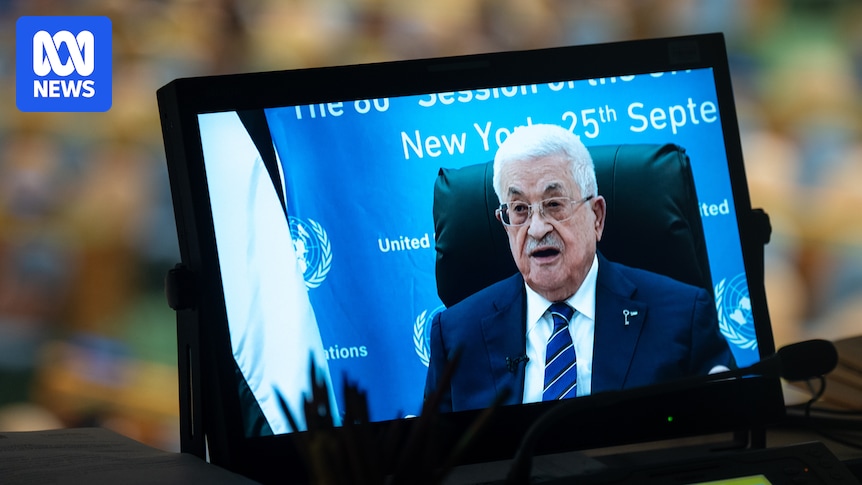Palestinian Authority President Mahmoud Abbas — who was blocked from attending the UN by the US — has used a video message to thank Australia and other nations for recognising Palestinian statehood.
US President Donald Trump, meanwhile, said he would not let Israel follow through on threats to annex the West Bank in response to the recognition move.
Mr Abbas said the “noble position” taken by Australia, the UK, France and others in recent days would not be forgotten.
But he also pointed to the “more than 1,000 resolutions” on Palestinian rights, adopted at UN bodies in past decades, that have not been implemented.
“There have been many efforts and many international initiatives without reaching an end to this tragic situation, and the Palestinian people are living under the yoke of occupation,” he said.
Though Palestine has been a central issue at this year’s UN High-Level Week in New York, Mr Abbas was refused a visa by the US.
Member nations voted to allow him to address the conference by pre-recorded video.
Experts hope UN report on genocide spurs action
He used his address to call out the “extremist Israeli government” for both a genocide in Gaza — an accusation last week backed by a UN commission of inquiry — and for supporting the “terrorism of settlers” in the West Bank, which is undermining the international push for a Palestinian state.
“What Israel is carrying out is not merely an aggression, it is a war crime and a crime against humanity that is both documented and monitored,” he said through a translator.
“And it will be recorded in history books and the pages of international conscience as one of the most horrific chapters of humanitarian tragedy in the 20th and 21st centuries.”
Mr Abbas addressed the general assembly as Israel continued its attack on Gaza City — the enclave’s largest urban area.
The assault has resulted in a “sharp increase” in civilian deaths in the past week, according to the UN Human Rights Office in the Occupied Palestinian Territory.
Mahmoud Abbas appeared by video after being denied a visa. (AP: Angelina Katsanis)
Some Israeli officials have also threatened to annex the West Bank, which is partially governed by the Palestinian Authority, in response to Australia and other nations recognising a Palestinian state.
But on Thursday, Mr Trump said he had told Israeli Prime Minister Benjamin Netanyahu he would not let that happen.
“I’m not allowing Israel to annex the West Bank,” Mr Trump said.
“There’s been enough. It’s time to stop now.”
Multiple US media outlets have reported Mr Trump gave that pledge to Arab leaders in a meeting on the sidelines of the UN conference earlier in the week.
‘Palestine is ours’
On Monday, Australia and nine other Western countries told a special conference they would now recognise Palestine as a sovereign state, after refusing to for decades.
“Our people will not forget this noble position,” Mr Abbas said. He also thanked those who had protested around the world for Palestinian rights.
He said the authority was ready to work with Mr Trump, France, Saudi Arabia and the UN to implement a peace plan adopted by the General Assembly.
Takeaways from day two at UN world leaders week
The so-called “New York Declaration”, which outlines steps towards a two-state solution, won the support of 142 of the UN’s 193 member states earlier this month. Israel, the US and eight other countries voted against it.
Mr Abbas repeated calls for an immediate ceasefire, the free flow of aid through UN groups and the release of Israeli hostages and Palestinian prisoners.
He condemned Hamas’s October 7 attack and said the rival group should have no role in ruling Gaza.
The Palestinian Authority is “ready to bear full responsibility for governance and security” in Gaza, Mr Abbas said. It has promised future elections, and to meet other conditions, in exchange for Western nations’ recognising Palestinian statehood.
Mr Netanyahu is expected to speak at the UN on Friday, local time. He has accused Australia and other Western nations of “rewarding Hamas” by recognising Palestinian statehood.
Mr Abbas said the “time has come for the international community to do right by the Palestinian people”.
“Palestine is ours,” he said.
“We will not leave our homeland. We will not leave our lands.
“Our people will remain rooted like the olive trees, same as the rocks. We will rise from under the rubble to rebuild.”

